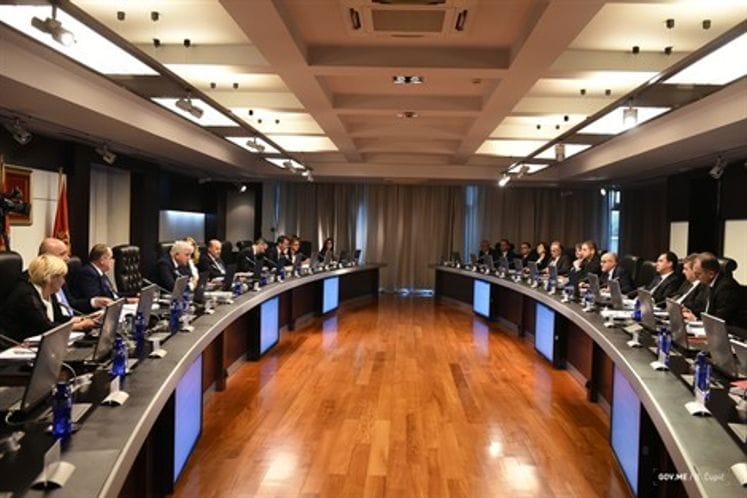- Government of Montenegro
Montenegro's Cabinet Session
Montenegro's Cabinet Session

Podgorica,
Montenegro (9 June 2017) -- In accordance with the Law on Budget and Fiscal
Responsibility, the Government of Montenegro adopted the Proposal of Fiscal Strategy 2017-2020 at yesterday's session, chaired
by Prime Minister Duško Marković. The
Strategy defines the objectives and priorities of economic policy, presents
challenges on the path of sustainable growth and prosperity, as well as the
manner of their mitigation or elimination. Bearing in mind the growing fiscal
pressures, additional measures of fiscal consolidation are determined in order
to ensure the full credibility of the public finances, the contribution to the
budget surplus, the establishment of the declining trend in public debt, with a
more equitable distribution of social funds, a further rise in pensions and
stable economic growth. In making such conception, attention was paid to
ensuring the equitable distribution of the tax burden, the equitable
distribution of social benefits and protection of the most vulnerable classes
of society. The need for Montenegro to remain a competitive destination for
foreign investment in terms of the amount of tax burden was accepted. The Strategy
identifies measures on both the revenue and the expenditure side, and their
overall effect on the net amount is EUR 117 million.
The increase
in budget revenues will be ensured by implementing the measures of tax policy
relating to: excise tax increasing on cigarettes; excise tax increasing on
carbonated water supplemented with sugar; the introduction of excise tax on
coal; and increasing the general VAT rate from 19 to 21 percent, whereby the
application of these measures is planned from 1 January 2018.
The lower
VAT rate remains unchanged, so the most important products are still taxed at a
rate of 7 percent, so it will not jeopardise the standard of economically
vulnerable population.
The reduction
of budget expenditures is planned through the implementation of appropriate
measures of rationalisation and savings, and care was taken to establish a set
of measures that will have the least negative impact on the living standards
and economic growth.
Accordingly,
the measures that will be implemented are the reduction in gross wages fund by
decreasing the allocation for the variable part of the profits and recruitment,
as well as reduction of yield for the A, B and
C groups of jobs for 6 percent, making a total of 15 percent along with earlier
reductions.
In addition,
the social benefit policy was redefined, especially measure of fee for mothers
with three or more children, the implementation of which implies a greater
degree of fairness and non-discrimination in the distribution of social funds.
For the
purpose of enhanced care for the youngest, increasing the amount of child
support is envisaged for the children beneficiaries of financial family support,
children beneficiaries of the allowance for care and assistance, children
beneficiaries of personal disability and children without parental care, by 20 percent.
The Government
adopted the Law on Amendments to the Law
on Social and Child Protection. The Law improves the existing provisions
relating to the exercise of basic material benefits, as well as other provisions
to ensure the goal of social and child protection.
In accordance
with the constitutional obligation of the Government, Draft Law on Enforcement of Decision of the Constitutional Court of
Montenegro U-I No 6/16 of 19 April 2017 was adopted. The Draft Law regulates
the legal status of the beneficiary of the right to compensation on the basis
of the birth of three or more children, under the Law on Amendments to the Law
on Social and Child Protection that have ceased to be valid on the day of
publication of the Constitutional Court's Decision of 19 April 2017.
The Action Plan to combat the gray economy
was adopted, as well. The Plan sets out measures to combat gray economy under
the jurisdiction of various state bodies, aiming to contribute to reducing the
fiscal deficit and to encourage businesses to introduce commerce into legal. To
this end, the Commission to combat the gray economy was created.
In accordance
with the need to involve all stakeholders in the public administration reform
process, Decision amending the Decision
of the Council for Public Administration Reform was adopted. Apart from the
members of the Government, the Council will include representatives from the
areas of business and civil society, trade unions, the Association of
Municipalities and independent experts in the field of public policies.
The Government
adopted Draft Law on the final account
of the Budget of Montenegro for 2016.
As part
of the harmonisation of the current legislation with the new Law on
Administrative Procedure, Draft Law
amending the Law on Tax Administration was adopted.
The Government
also adopted Report on Activities of the
Investment and Development Fund of Montenegro for 2016, with the financial
statements and Independent Auditors' Report for 2016.
The Draft Law on amendments to
the Law Against Discrimination was adopted. The Draft Law regulates certain
provisions relating to the particular forms and fields of discrimination and
certain penalty provisions, given the fact that current legal provisions did
not cover all forms and fields of discrimination and did not show the expected
results.
The Government
adopted the Regulation on amendments to
the Regulation for the implementation of the Customs Law, which allows for
substitution of particular provisions to accelerate and simplify the customs
procedure with express shipments.
Regulation amending Regulation on detailed criteria and methodology for determining the market value of property was adopted, as well.
PUBLIC RELATIONS
SERVICE OF THE GOVERNMENT OF MONTENEGRO
